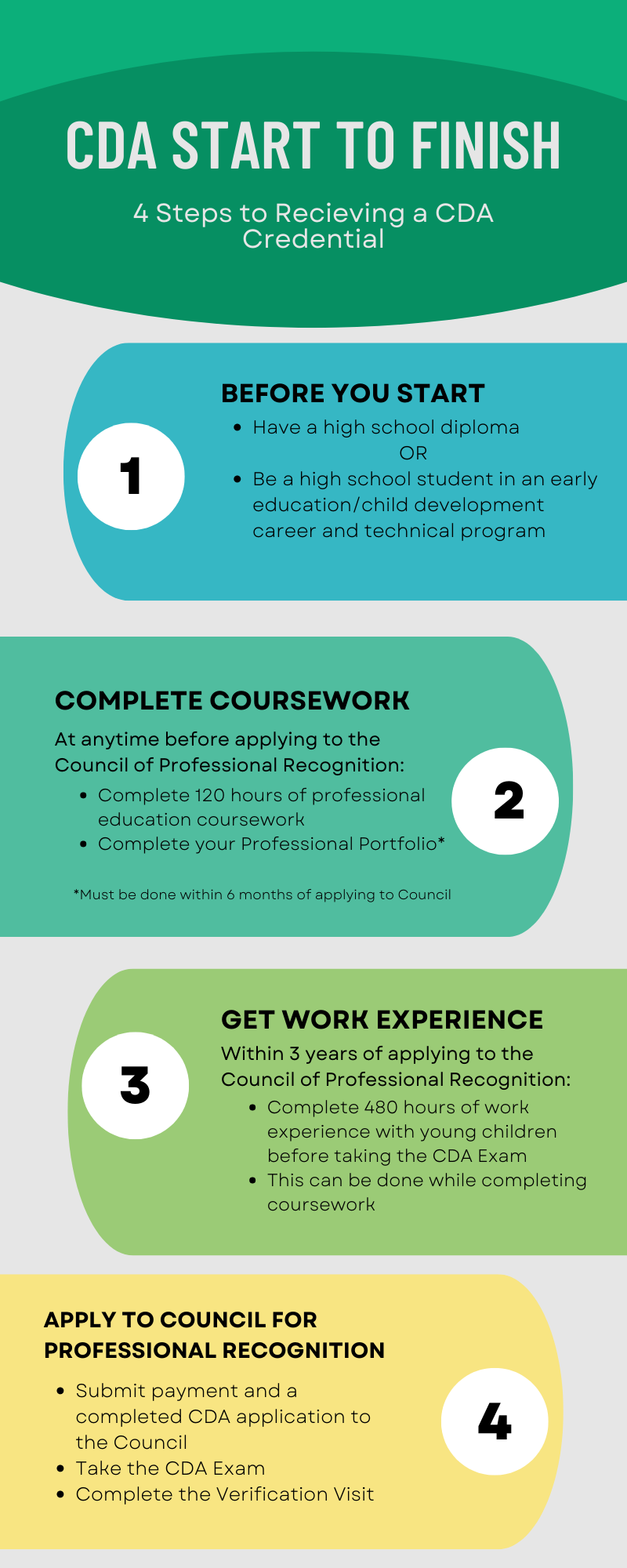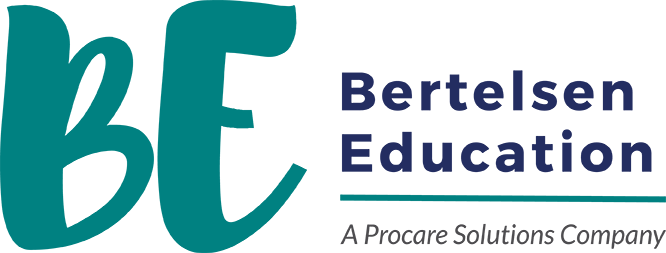Write your awesome label here.
Earn your CDA with Bertelsen Education
Take CDA classes online to meet the training hour requirement with portfolio support, all online and on your own time!
What is a CDA?
The Child Development Associate® (CDA) Credential™ is the most widely recognized credential in early childhood education. It's a great way to advance your career in early childhood education. The CDA® certification is based on a core set of competency standards set by the Council for Professional Recognition that guide early childhood professionals toward becoming qualified educators of young children.
How do I earn my CDA Credential?
There are 4 steps to earning a CDA Credential.
Our CDA Pathway provides you with professional development training and portfolio support, so you are well prepared for your Verification Visit and CDA Exam.
Our CDA Pathway provides you with professional development training and portfolio support, so you are well prepared for your Verification Visit and CDA Exam.
Prepare
Before you apply:
Complete 120 hours of professional education covering the 8 CDA subject areas
Complete 120 hours of professional education covering the 8 CDA subject areas
Within 3 years of applying:
Work 480 hours with children in your chosen age group
Work 480 hours with children in your chosen age group
Within 6 months of submitting your application:
Prepare your professional portfolio
Prepare your professional portfolio
Apply
Submit your application and pay the application fee
Select a PD Specialist
Complete Director's Permission Statement
Receive Ready to Schedule notification
Select a PD Specialist
Complete Director's Permission Statement
Receive Ready to Schedule notification
Demonstrate
Schedule Verification Visit
Show Professional Portfolio at Verification Visit
Take the CDA Exam
Show Professional Portfolio at Verification Visit
Take the CDA Exam
Earn
Celebrate your accomplishment!
Pricing
The CDA Pathway from Bertelsen Education makes earning your CDA Credential easy and fun at a competitive price!
- Additional fees paid to the CDA Council will apply. See FAQs.
Q&A
Why is having a CDA important for early childhood educators?
The Child Development Associate credential is the most widely recognized credential in early childhood education and is key for career advancement in ECE, according to the Council for Professional Recognition. The CDA is based on a core set of competency standards that guide early care professionals as they work toward becoming qualified teachers of young children.
The CDA allows early educators to meet state and national requirements, and it demonstrates their knowledge, skills and abilities when working with young children. Early childhood educators with a CDA have more career-advancement opportunities. Plus, these educators gain knowledge in child growth and development, curriculum planning and behavior management through coursework and practical experience.
Q&A
What are the requirements for earning a CDA?
Candidates must show proof of high school education with a valid high school diploma, a GED or through enrollment as a junior or senior in a high school career/technical program in early childhood education, according to the Council for Professional Regulation.
Applicants must complete 120 clock hours of professional early childhood education, including 10 hours in each of the eight CDA subject areas and have 480 hours of work experience working with children in the age group matching the CDA application.
Then candidates must select a CDA professional development specialist, who will conduct a verification visit and a family questionnaire and professional portfolio must be completed. The candidate must pass a test to earn the CDA.
Applicants must complete 120 clock hours of professional early childhood education, including 10 hours in each of the eight CDA subject areas and have 480 hours of work experience working with children in the age group matching the CDA application.
Then candidates must select a CDA professional development specialist, who will conduct a verification visit and a family questionnaire and professional portfolio must be completed. The candidate must pass a test to earn the CDA.
Q&A
How long does it take to earn a CDA?
Candidates must work 480 hours with young children in an accredited institution. They also must complete 120 hours of professional development training (which is offered through the CDA Pathway), as well as schedule and complete a site/verification visit with the CDA Council before taking the CDA Council exam.
Q&A
Tips for Earning Your CDA
Be organized and set small, manageable goals. Aim to complete a certain number of training hours or portfolio components each week. Make sure your supervisors know that you’re working toward a CDA -- they might offer support such as flexible work hours. And connect with fellow CDA candidates working toward the same goal! Sharing experiences, resources and advice can be invaluable. Form a study group to support each other.
CDA Curriculum Pathway
Planning a safe and healthy learning environment
Emergency Preparedness
Creating Successful Sleep for Infants + Safe Sleep
Environment
Health and Nutrition Part 1
Health and Nutrition Part 2
Potty Training in Childcare 101
Germ Busters
Classroom Management 1
Family Style Dining
Understanding the principles of child development and learning
Tools for Lifelong Learning
Developmentally Appropriate Practice: Early Childhood Educator
Developmentally Appropriate Practice (DAP): In Action - Creating a Caring, Equitable Community of Learners
Realizing Risk and Creating Calm
Child Development: 0-24 Months
Child Development: 2-5 Years
Observing and recording children's behavior
Developmental Delays and Autism Spectrum Disorders: Understanding and Recognizing the Signs
Emotional Coaching
Preventing, Recognizing & Reporting Abuse & Neglect
Classroom Management 3
Developmentally Appropriate Practices (DAP): Observing, Documenting and Assessing Children's Learning
Maintaining a commitment to professionalism
Ethics: The Parable of the Dirty Diaper
Address Your Stress
Transportation
Connect Before You Correct
Advocating for Children
Managing an effective program operation
Conflict Management
Routines for Children in Childcare
Classroom Management 2
Setting and Planning Program Goals
Administration 101
Preschool Planning and Curriculum
Administrative Tools: Finance
Building productive relationships with families
Building Trust with Parents Through Engagement
Understanding Families
Creating Intentional Parent Meetings
Culture and Families
Parents: The Foundation
Communication with Families
Supporting children's social and emotional development
Character Bootcamp: Love and Kindness
Understanding Diversity and Promotion of Inclusion in a Childcare Setting
Teaching Self-Regulation and Self-Esteem
Behavior Management
Having Hard Conversations
Character Bootcamp: Courage
Mindfulness in Preschoolers
Character Bootcamp: Honesty
Character Bootcamp: Loyalty and Dependability
Creating Smooth Transitions
Advancing children's physical and intellectual development
Physical Activity in Children
Learning Through Play
The Importance of Literacy in Children
Teaching Vocabulary
Using STEM in Every Learning Environment
Learn to Sign
Approaches to Learning
What are the steps to getting a CDA credential?

pricing





















































